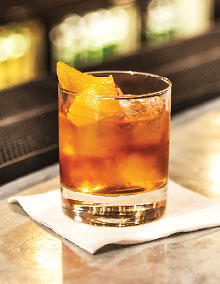Can Ketamine Curb Excess Drinking?
Abstract
Two small clinical studies suggest that a ketamine infusion can reduce alcohol and cocaine use when given as an adjunct to behavioral counseling.
The anesthetic ketamine is still the new kid on the block in depression therapy, but researchers are already turning their eyes toward other applications for this pharmacological agent. A study published in AJP in Advance this past December posits that ketamine—when combined with behavioral therapy—can help curb problem drinking.

The study, conducted by a team at Columbia University Medical Center, involved 40 adults who were seeking treatment for alcohol use disorder and agreed to participate in this comparison trial. All participants, who had no other substance use problems, were provided five weeks of motivational enhancement therapy, a commonly used counseling tool for alcohol use disorder that encourages patients to self-motivate and change negative drinking behavior.
During the second week of therapy, the participants received a 52-minute infusion of either ketamine or the sedative midazolam. The investigators chose midazolam as the control because it has similar conscious-altering effects as ketamine but no known effects on alcohol dependence. To further temper any therapeutic expectations, the participants were told they might receive one of several psychoactive drugs.
In the three weeks following the infusion, fewer participants who received ketamine reported drinking any alcohol (47% versus 59% in the midazolam group) or having a heavy drinking day (18% versus 41%); heavy drinking was defined as more than four drinks for men or three drinks for women a day. The ketamine participants were also far less likely to drop out of the motivational therapy sessions (none versus six dropouts).
A few months prior, the Columbia researchers had conducted a similar five-week comparison trial with 55 adults with cocaine use disorder. In that study, which was also published in AJP, a single ketamine infusion was superior to midazolam at promoting cocaine abstinence and reducing cocaine cravings when combined with a mindfulness-based psychotherapy.
“Both studies had small sample sizes, but the data have enough legs that it’s definitely worth pursuing this line of research further,” said Kathleen Brady, M.D., Ph.D., a professor of psychiatry and vice chair for research at the Medical University of South Carolina.
Brady was particularly excited about the positive findings with cocaine abstinence. (Brady is a deputy editor of AJP and selected the cocaine study as her editor’s pick for 2019. See story.) “We are seeing a resurgence of cocaine and stimulant abuse, which might foretell our next drug epidemic,” she told Psychiatric News. There are no approved medications to treat cocaine use disorder, so if ketamine continues to show promise, it would likely be fast tracked by the Food and Drug Administration, she added.
Lead investigator Elias Dakwar, M.D., an associate professor of psychiatry at Columbia University, said the positive findings in both studies highlight the similarity of substance use problems.
“Addictions are all propelled by the same deficits,” he explained. “Alcohol and cocaine affect the same brain structures and produce similar vulnerable feelings like demoralization, high cravings, and low mindfulness.”
One other intriguing commonality is the buildup of learned helplessness, in which the substance becomes so central to people’s lives that they feel powerless to stop taking it even though they know their actions are wrong. Dakwar said that learned helplessness is often seen in chronic depression as well (wherein patients stop caring about getting better), and this phenomenon is believed to be regulated by glutamate receptors. Ketamine also happens to target these receptors, which led Dakwar to assess its potential to shift a person’s perspective and make behavioral therapy more effective.
Ketamine research is still a young field, so it’s too soon to say how the compound promotes drug abstinence. One possibility put forward by a research group at University College London is that ketamine interferes with memories that link drinking with a feeling of reward. Such memories trigger the desire to drink in response to cues like the sight of a bar or the smell of alcohol. In a study involving 90 adults with high levels of drinking, the London team found that ketamine was more effective at reducing the urge to drink when administered shortly after someone had looked at alcohol-related visuals (to stimulate drinking memories) as opposed to neutral visuals like a picture of orange juice.
Brady said the London study, which was published November 26, 2019, in Nature Communications, was provocative as well but had some questionable methodology. “The participants who got ketamine after retrieving alcohol-related memories had higher baseline drinking rates than the other group,” she explained. “Therefore, they had more room to improve their behavior.”
Dakwar also thinks the London study researchers may have oversold their findings but also believes trying to focus on specific biological mechanisms takes away from the complexity of substance use disorders. “There is a lot of social and psychological issues that contribute to substance use, and we need to address all aspects of this problem.”
“I think ketamine, administered in a responsible manner, can be part of a model that harmonizes psychotherapy and medication to provide that comprehensive treatment,” he concluded.
Both Columbia University studies were supported by a grant from the National Institute on Drug Abuse; the alcohol study received additional support from the National Institute on Alcohol Abuse and Alcoholism and the New York State Psychiatric Institute. The University College London study was supported by a grant from the Medical Research Council. ■
“A Single Ketamine Infusion Combined With Motivational Enhancement Therapy for Alcohol Use Disorder: A Randomized Midazolam-Controlled Pilot Trial“ is posted here. “A Single Ketamine Infusion Combined With Mindfulness-Based Behavioral Modification to Treat Cocaine Dependence: A Randomized Clinical Trial” is posted here. “Ketamine Can Reduce Harmful Drinking by Pharmacologically Rewriting Drinking Memories” is posted here.



